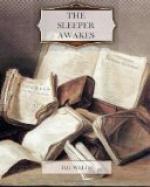“I do not know who your party may be. I am in the dark, and you keep me in the dark. But I know this, that I am secluded here for no good purpose. For no good purpose. I warn you, I warn you of the consequences. Once I come at my power—”
He realised that to threaten thus might be a danger to himself. He stopped. Howard stood regarding him with a curious expression.
“I take it this is a message to the Council,” said Howard.
Graham had a momentary impulse to leap upon the man, fell or stun him. It must have shown upon his face; at any rate Howard’s movement was quick. In a second the noiseless door had closed again, and the man from the nineteenth century was alone.
For a moment he stood rigid, with clenched hands half raised. Then he flung them down. “What a fool I have been!” he said, and gave way to his anger again, stamping about the room and shouting curses.... For a long time he kept himself in a sort of frenzy, raging at his position, at his own folly, at the knaves who had imprisoned him. He did this because he did not want to look calmly at his position. He clung to his anger—because he was afraid of fear.
Presently he found himself reasoning with himself. This imprisonment was unaccountable, but no doubt the legal forms—new legal forms—of the time permitted it. It must, of course, be legal. These people were two hundred years further on in the march of civilisation than the Victorian generation. It was not likely they would be less—humane. Yet they had cleared their minds of formulae! Was humanity a formula as well as chastity?
His imagination set to work to suggest things that might be done to him. The attempts of his reason to dispose of these suggestions, though for the most part logically valid, were quite unavailing. “Why should anything be done to me?”
“If the worst comes to the worst,” he found himself saying at last, “I can give up what they want. But what do they want? And why don’t they ask me for it instead of cooping me up?”
He returned to his former preoccupation with the Council’s possible intentions. He began to reconsider the details of Howard’s behaviour, sinister glances, inexplicable hesitations. Then, for a time, his mind circled about the idea of escaping from these rooms; but whither could he escape into this vast, crowded world? He would be worse off than a Saxon yeoman suddenly dropped into nineteenth century London. And besides, how could anyone escape from these rooms?
“How can it benefit anyone if harm should happen to me?”
He thought of the tumult, the great social trouble of which he was so unaccountably the axis. A text, irrelevant enough, and yet curiously insistent, came floating up out of the darkness of his memory. This also a Council had said:
“It is expedient for us that one man should die for the people.”




